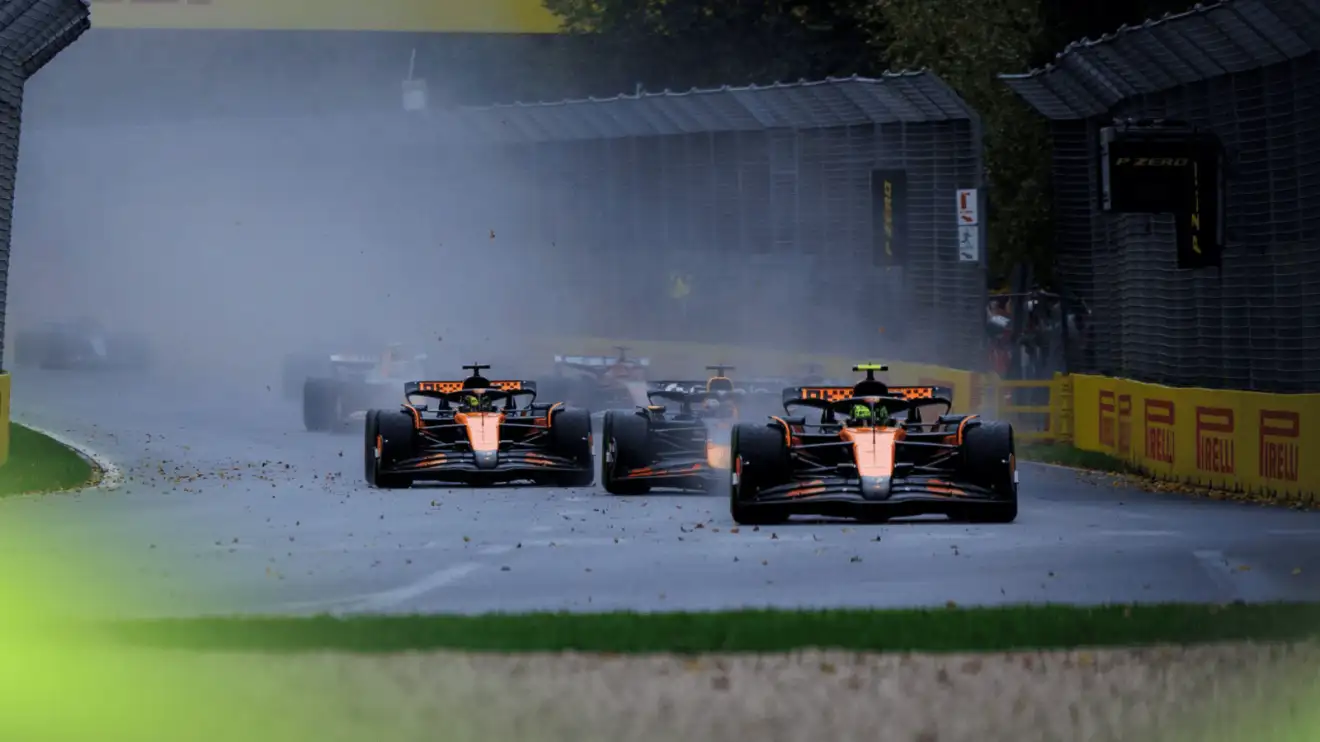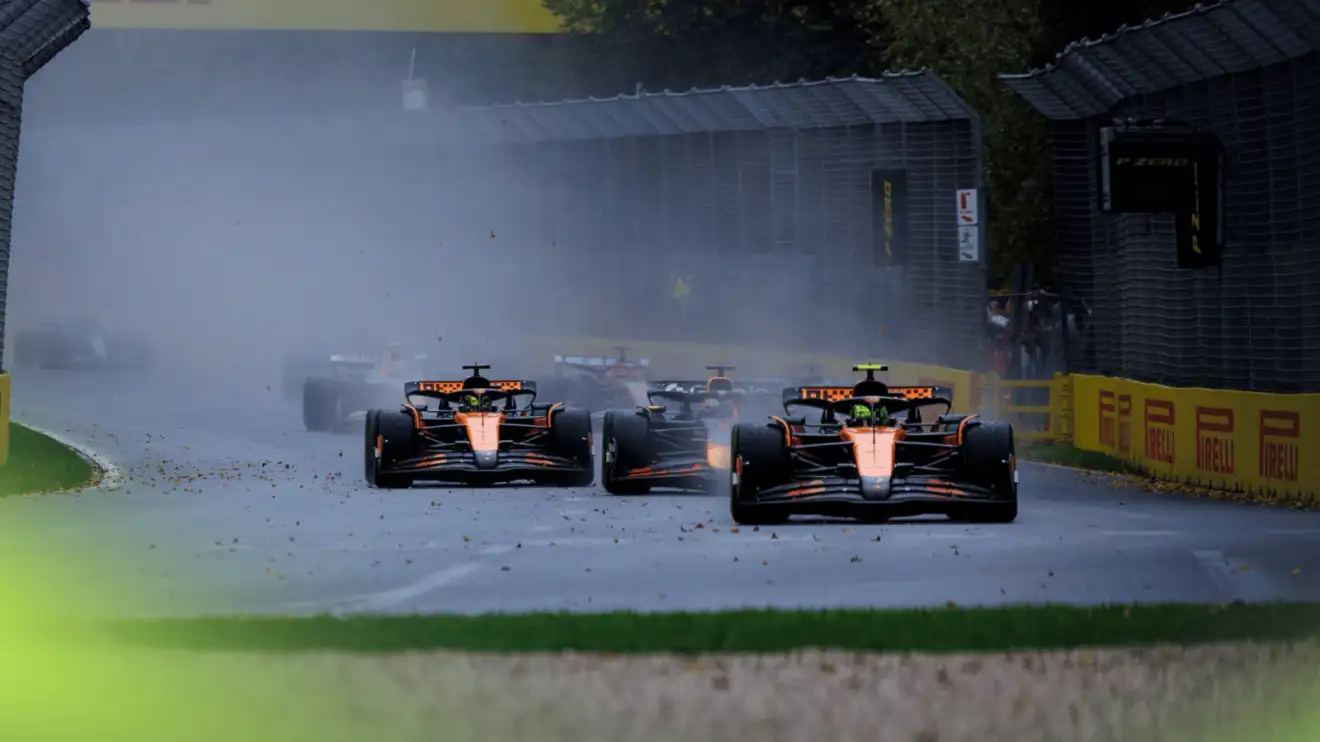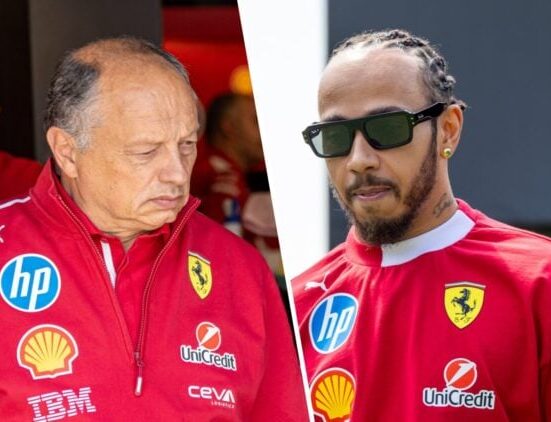F1 2026 rules at centre of shock axe claim in favour of V10s – report
19 Mar 2025 11:17 AM

Lando Norris (McLaren MCL39) leads the field into Turn 3 at the start of the 2025 Australian Grand Prix
Formula 1’s stakeholders have discussed dropping the new F1 2026 rules and bringing back V10 engines for the start of the 2028 season, it has been claimed.
It comes after PlanetF1.com revealed last month that the FIA has established a working group to establish a potential return to V10 engines.
F1 2026 rules to be dropped in favour of V10 return?
Additional reporting by Thomas Maher
PlanetF1.com understands that F1’s engine manufacturers have shown what can be described as a lukewarm response to the proposals, citing a lack of road relevance to the plans.
The F1 2025 season is set to mark the final year of the current regulations, with significant changes on the way to both the chassis and engines from next season.
Among the biggest changes for F1 2026 include a move to 50 per cent electrification, full sustainable fuels and the introduction of so-called active aerodynamics.
F1’s engine rules have been largely unchanged since the start of the V6-hybrid era in 2014, with the 2026 regulations described as some of the biggest changes in the sport’s history.
F1 2026: Formula 1’s season of change
👉 F1 2026: Confirmed teams and power unit suppliers for F1’s huge regulation changes
👉 F1 2025 v F1 2026: Nine key questions ahead of huge regulation changes
Mohammed Ben Sulayem, the FIA president, hinted last month that V10 engines, last used in 2005, could return on sustainable fuels in the coming years as F1 considers “the appropriate technical path” going forward.
A report by Germany’s Auto Motor und Sport on Wednesday has claimed that the plans to bring back V10s have become ‘increasingly serious’ with one potential scenario on the table resulting in the 2026 rules being cancelled entirely.
In that eventuality, the current rules would be retained for another two years in 2026 and 2027 before F1 reintroduces V10s, running on sustainable fuels, from 2028.
Another possibility is that the 2026 rules are introduced as planned, but are kept for only three years rather than the expected five, again opening the door to bring back V10s as soon as 2028.
PlanetF1.com understands that any decision to drop the 2026 rules would have to be approved by the F1 Commission, which includes the teams and engine manufacturers.
It is thought highly unlikely that these parties would vote to abandon the upcoming regulation changes, having committed vast resource to the new rules over recent years.
It is understood that the plans may be a negotiating tactic, with the extreme suggestion of a swift reintroduction of V10 engines potentially opening the door for a compromise solution – such as a return to V8 engines with a turbo and hybrid ancillaries – in the future.
A decision to abandon the 2026 rules – designed to tempt major car manufacturers like Audi F1, set to take over the existing Sauber team next season – with less than a year before they are introduced would prove highly controversial.
Much scepticism surrounds the 2026 rules with the new technology proving challenging to master for F1’s engine manufacturers.
Speaking to media including PlanetF1.com at the Daytona 24 Hours earlier this year, Honda Racing Corporation president Koji Watanabe admitted the Japanese manufacturer, who will partner with the Aston Martin team from next season, are “struggling” with the “very difficult” challenges posed by the new engine regulations.
There are also fears that the 2026 season will see one team emerge as F1’s dominant force at the beginning of a new rules cycle, with the performance of teams converging when regulations are left to mature over a number of years.
A V10 engine is seen as cheaper and simpler than the current power units with a potential return also allowing F1 to facilitate a reintroduction of smaller and lighter cars following complaints over the size and weight of the current machines.
A V10 return would also act as an insurance policy if a number of manufacturers suddenly elect to withdraw from F1 in a repeat of 2008/09, when Honda, BMW and Toyota all abandoned their F1 projects in the space of 12 months during the era of V8 engines.
Private suppliers such as Cosworth would be able to produce a competitive V10 engine, reducing F1’s reliance on the major car manufacturers currently involved.
According to AMuS, some believe that Ben Sulayem’s enthusiasm to bring back V10 engines could be an attempt to protect the FIA from being blamed if the 2026 rules prove a disappointment.
Others are of the opinion that Ben Sulayem is ‘wanting to help’ the new Cadillac F1 team, who have committed to producing their own engine in 2028, by pushing for a return to V10s.
A return to V10 is described as ‘perfect’ for Cadillac F1, who confirmed last December that they will compete with customer Ferrari engines and gearboxes for their first two seasons on the grid.
Under the proposals, Cadillac could be powered by Ferrari in 2026/27 before producing their own V10 for 2028, a far more straightforward task than taking on F1’s long-established engine manufacturers with no prior experience with the technology involved.
The reports adds that F1’s existing teams are ‘torn’ over the proposals to cancel the 2026 rules, with each team’s stance linked to their political motivations.
One unnamed ‘insider’ is quoted saying: “The manufacturers who are putting the most pressure on [to drop the new rules] are those who already know that they are behind schedule with their 2026 engine.”
It is said that Ferrari and Red Bull are thought to be among those in favour of a V10 return.
However, a decision to delay the 2026 rules would likely leave Red Bull in trouble as the team have no engine in place to compete under the current regulations.
Red Bull’s newly established engine division, Red Bull Powertrains, has been working on a 2026 power unit in conjunction with US giants Ford ahead of Honda’s switch to Aston Martin from next season.
Audi F1 would be faced with the same predicament with the German manufacturer working solely on an engine for the 2026 rules.
Read next: Uncovered: How teams are exploiting the flexi-wing gap effect










Leave feedback about this